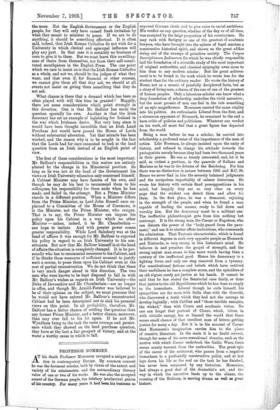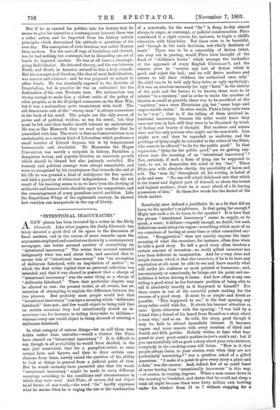PROFESSOR MOMMSEN.
AT his death Professor Mommsen occupied a unique posi- tion in contemporary Europe. By common consent he was the foremost scholar, both by virtue of the extent and variety of his attainments, and the extraordinary literary value of one or two of his works. He was also the accepted savant of the German people, the tutelary intellectual genius of his country. For many years it had been his business to expound German ideals -and-to give-voice to racial ambitions. His verdict on any question, whether of the day or of all time, was accepted by the large proportion of his countrymen. He may rank with Savigny as one of the greatest of academic lawyers, who have brought into the sphere of legal maxims a constructive historical spirit, and shown us the great edifice rising out of the swamps of primitive society. The Corpus Inscriptionum Latinarum for which he was chiefly responsible laid the foundation of a scientific study of the most important of original authorities, and classical epigraphy owes more to him than to any modern scholar. But his great achieve- ment is to be found in the work which be wrote less for the student than for the ordinary reader. He wrote the history of Rome, not as a mosaic of painfully deciphered facts, but as a story of living men, a drama of the rise of one of the greatest of human peoples. Only a laborious scholar can know what a deep foundation of scholarship underlies the vivid narrative; but the most prosaic of men can feel in the tale something of an epic magnificence. Mommsen carried the same vitality into his politics. An enthusiastic Liberal from the first, and a strenuous opponent of Bismarck, he remained to the end a keen critic of policies and politicians. Whatever our verdict on his work, all must feel that a great figure has departed from the world.
Being a man before he was a scholar, he carried into scholarship a profound sense of the importance of the man of action. Like Freeman, he always insisted upon the unity of history, and refused to change his attitude towards the protagonists merely because they had been two thousand years in their graves. He was as keenly interested, and, let it be said, as violent a partisan, in the quarrels of Sullans and Mariana as he was in the debates of the Reichstag. For him there was no distinction in nature between 1805 and B.C. 90. Hence we never find in him the severely balanced judgments and the scrupulous impartiality of calmer historians. He wrote his history with certain fixed presuppositions in his mind, but happily they are so very clear on every page that the student can detect them and allow, for them. In the first place, he was a democrat, rejoicing in the strength of the people, and when he found a Man capable of leading the masses, ready to fall down and worship him. But the democracy must be a militant one. The ineffective philanthropist gets from him nothing but contempt. It is the strong man, the Caesar or Napoleon, who can discern the power of the "body-guard from the pave- ment," and use it to shatter effete institutions, who commands his admiration. That Teutonic characteristic, which is found in different degrees in such very opposite people as Bismarck and Nietzsche, is very strong in this historian's mind. He believes in and preaches the gospel of strength, and the strong unjust man seems to him more worth having than a• century of the ineffectual good. Hence his democracy is' a fighting force, and only one step removed from a tyranny.. For constitutional fictions and beliefs which have outlived their usefulness he has a complete scorn, and the upholders of an old regime rarely get justice at his hands. It cannot be said that he has stated the Senatorial case fairly, or done • that justice to the old Republicans which he has done so amply to the iconoclasts. Liberal though he calls himself, his sympathies are far more with Sulk than with the Gracchi, who discovered a truth which they had not the courage to develop logically ; with Catiline and "those terrible energies, the wicked," than with Cicero and academic virtue. No one can forget that portrait of Cicero, which, bitten in with vitriolic energy, has so biassed the world that there seems small chance of that excellent man of letters getting justice for many a day. But it is in his account of Caesar that Monunsen's imagination carries him to the plane of creative literature. In the main it is no doubt correct, though for some of his more sensational theories, such as the motive with which Caesar undertook the Gallic' Wars,,there seems scanty warrant from the authorities. The great epic of the career of the aristocrat, who passes from a negative iconoclasm to a profoundly constructive policy, and at last lays down his life as the seal on the task he has finished,', has never been surpassed by any historian. Mommsen., had always a good deal of the dramatist's art, and the way in which the narrative leads up to the climax, the crossing of the Rubicon, is moving drama as well as great history.
But if he so carried his politics into his history that he seems to give his narrative a contemporary interest, there was a reflex action, and he imported from his history certain principles which determined his attitude to questions of his own day. His conception of civic freedom was rather Roman than modern. For the cast-off rags of feudalism and clerical- ism he had nothing but contempt, but in discarding one set of bonds he imposed another. He was at all times a thorough- going Individualist. He detested slavery, and the war between North and South in America seemed to him a holy crusade. But his conception of freedom, like that of most Individualists, was narrow and abstract; and he was prepared to submit to other bonds. He was nominally opposed to the doctrine of Imperialism, but in practice he was an enthusiast for the domination of his own Teutonic race. His nationalism was strong enough to make him a violent critic of the policy of other peoples, as in his ill-judged comments on the Boer War, but it was a nationalism quite inconsistent with itself. The old democratic cult of the "strong man" is always somewhere in the back of his mind. The people are the only source of power and of political wisdom, so ran his creed ; but they must be led, and their leader should tolerate no malcontents. He was so like Bismarck that we need not wonder that he quarrelled with him. The truth is that no Conservativism is so unshakeable as a certain kind of Liberalism which professes a small number of Liberal dogmas, but is by temperament bureaucratic and absolutist. To Mommsen. the Hague Convention was merely a misprint in history, Socialism a dangerous heresy, and popular liberties an uncertain growth which should be blessed but also jealously curtailed. His honesty and political courage were always remarkable, and were so recognised by his countrymen that towards the end of his life he was granted a kind of indulgence for free speech, and held a position of whimsical independence. But the net result of his teaching seems to us to have been the riveting of militarist and bureaucratic shackles upon his compatriots, and the encouragement of every grandiose racial ambition. Like the Republican Whigs of the eighteenth century, he showed how reaction can masquerade in the cap of liberty.































































 Previous page
Previous page